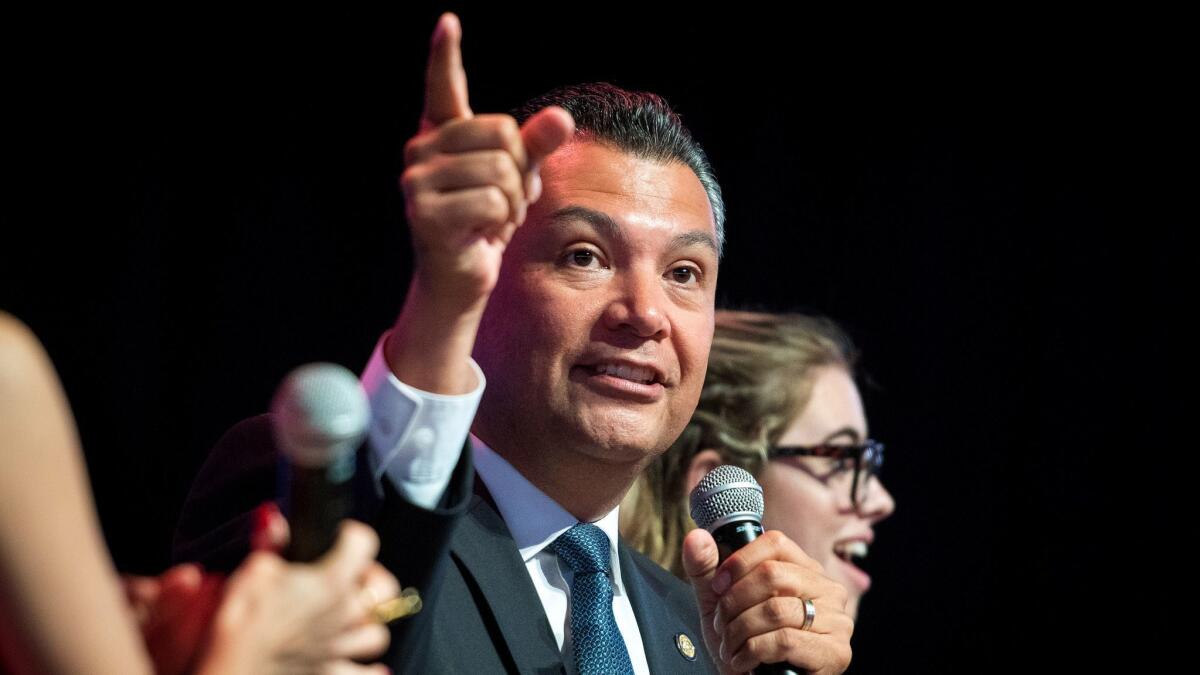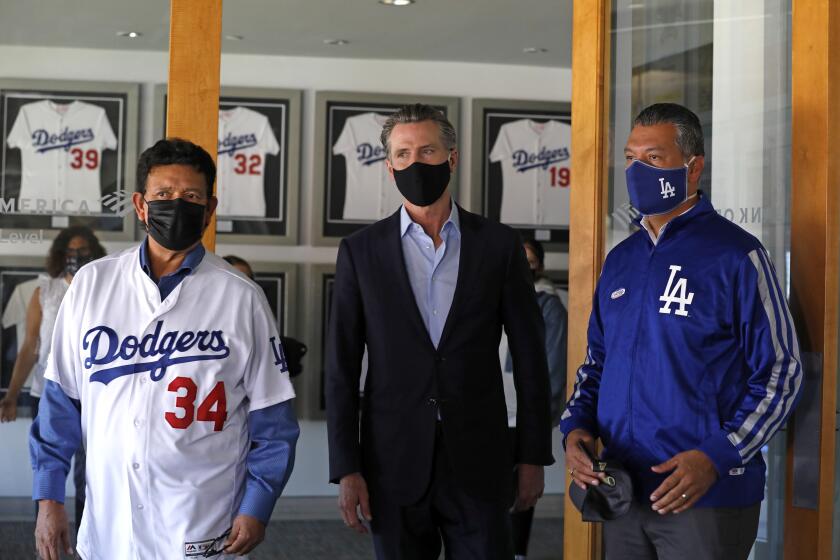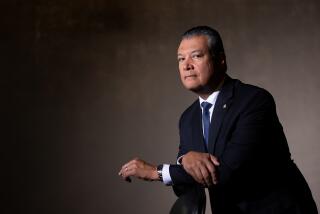Alex Padilla to become California’s first Latino U.S. senator, replacing Kamala Harris

- Share via
SACRAMENTO — Alex Padilla, a Los Angeles Democrat who once developed software for satellites but later rose through local and state political office to become California secretary of state, was chosen Tuesday by Gov. Gavin Newsom to serve in the U.S. Senate — an appointment that tears down a barrier for Latinos that has stood as long as California’s statehood.
Padilla, a longtime Newsom ally, will become the first Latino to represent California in the Senate, succeeding another history-making politician, Sen. Kamala Harris. Harris, who was the second Black woman and first South Asian to serve in the Senate, in November became the first woman elected vice president of the United States.
“Through his tenacity, integrity, smarts and grit, California is gaining a tested fighter in their corner who will be a fierce ally in D.C., lifting up our state’s values and making sure we secure the critical resources to emerge stronger from this pandemic. He will be a senator for all Californians,” Newsom said in a statement released Tuesday morning.
The son of Mexican immigrants who settled in the San Fernando Valley, Padilla rose to the upper echelon of state politics, closely shadowing the steady, decades-long ascension of Latino power and influence throughout California, from L.A.’s towering City Hall to the chandeliered chambers of the state Capitol.
At age 26, Padilla won a seat on the Los Angeles City Council during the anti-immigrant tumult of the 1990s, after California voters approved measures requiring “English-only” public schools and banning immigrants who were in the U.S. illegally from government assistance and services. Padilla, who earned a degree in mechanical engineering from the Massachusetts Institute of Technology, went on to become the city’s youngest council president, a state senator and California’s current two-term secretary of state.
“I’m just tremendously honored and humbled and look forward to bringing my story, and my journey, as an important perspective to the deliberations of the United States Senate,” Padilla told The Times in an interview shortly after Tuesday’s announcement. “I know there’s a lot of big-picture issues, but the COVID response is front and center. A relief package was done last weekend but much more is going to be necessary. This pandemic is far from over.”
Newsom’s announcement of Padilla’s appointment was made by news release and lacked the pomp and fanfare of the governor’s usual major actions, which are typically delivered in highly produced news conferences. That was driven largely by the fact that Newsom is currently in quarantine after having been exposed to a staff member who tested positive for the coronavirus.
Newsom contacted Padilla via Zoom on Monday night to tell him he was being appointed. Both men were home at the time, and Padilla teared up when Newsom told him the news.
The election of Democratic President-elect Joe Biden and Harris in November handed Newsom one of his most consequential and politically perilous opportunities in his first two years as California governor — deciding whom to appoint to fill Harris’ seat in the Senate, among the most coveted political offices in the nation. It remains unclear when Harris will officially resign from the Senate, allowing Padilla to take her place, before she is sworn in as vice president in January.
Newsom has faced months of relentless lobbying and pressure from powerful constituencies within the Democratic Party, even from some of his closest advisors.
Newsom, who has not said when he’ll make an announcement on Vice President-elect Kamala Harris’ Senate successor, is facing an onslaught of competing pressures over what is perhaps one of the most pivotal and politically consequential decisions he will make during his first two years in office.
The selection of Padilla presented a new and intense political challenge for Newsom. A coalition of Black women strongly advocated for Harris’ Senate seat to be given to another voice for their community and urged the governor to prioritize that continuity above other factors.
“I know politics comes into play, but for me there was a greater kind of cause and calling,” L.A. County Supervisor Holly Mitchell said. “I am disappointed that the governor didn’t see value in the opportunity that was presented to him to guarantee fair representation for Black women in the U.S. Senate.”
Mitchell is a member of a recently formed group known as Keep the Seat that had asked Newsom to appoint a Black woman. In a letter sent to the governor earlier this month, they urged him to appoint either Rep. Karen Bass (D-Los Angeles) or Rep. Barbara Lee (D-Oakland) as Harris’ successor.
Mitchell said Tuesday that while Padilla is a “wonderful statesman,” his work as California’s chief elections officer is vital and could have been reason enough to ask him to remain in Sacramento.
“There does not appear to be another state in the union that is poised to elect a Black woman to the U.S. Senate anytime soon,” she said.
Newsom said the responsibility was something he wouldn’t “wish even on my worst enemy” because his decision, no matter whom he appointed, was destined to raise the ire of those whose wishes were denied.
But choosing Padilla also provided Newsom an opportunity to salve some of those relationships. Just hours after announcing Padilla was his choice for the senate, Newsom nominated Democratic Assemblywoman Shirley Weber of San Diego to become the next secretary of State. If confirmed by the California Legislature, Weber would become the first Black woman to hold that position in state history.
The selection of California Atty. Gen. Xavier Becerra as health secretary in Biden’s Cabinet also provides Newsom a chance to make a plum appointment to fill that vacancy.
Padilla’s appointment does not require confirmation by the California Legislature, and his U.S. Senate seat will be up for grabs in the 2022 election. That gives Padilla just two years to set up shop in Washington and launch what is expected to be a very competitive, multimillion-dollar Senate race.
Though incumbency provides advantages when it comes to raising federal campaign funds, Padilla will be starting from scratch. Meanwhile, two potential Democratic competitors already have funds socked away in campaign accounts: Rep. Adam Schiff of Burbank has $13.7 million, and Rep. Katie Porter of Irvine has $10.2 million.
Rep. Tony Cárdenas (D-Los Angeles), a close friend to Padilla for more than two decades, said he had no doubt that Padilla would win over most Californians, no matter whom they backed for the appointment, and beat back any challenge in 2022.
“Alex Padilla, with his personality and his work ethic, is going to be able to unite our state and show us in two short years that he’s ready, willing and able to unify all communities across the state,” Cardenas said, “and then continue to have a very successful career in the United States Senate.”
Padilla, 47, has served as California’s secretary of state since 2015. He became one of the first statewide officials to tangle with President Trump over his unfounded allegations in 2016 that millions of California ballots had been cast illegally. In 2017, Padilla rejected requests by Trump’s voter fraud commission for access to detailed voter information from the state, citing privacy concerns.
His most notable achievement as chief elections officer was his push for enactment of the state’s Voter’s Choice Act, allowing counties to swap out neighborhood polling places for community vote centers as long as they also mailed a ballot to every registered voter. But another high-profile program — the state’s automatic voter registration program at DMV offices — was beset by a number of errors when it debuted in 2019.
“The good news is, they were quickly identified and quickly addressed,” Padilla said in a recent interview. “Overall, the program has been an overwhelming success.”
Padilla will leave one unsettled and potentially embarrassing item in limbo as he departs the job of secretary of state. His office has been embroiled in a battle with state government officials over a $35-million contract aimed at increasing voter turnout during the November election, awarded to a national political strategy company with ties to Biden.
While Republicans have criticized the awarding of the contract as politically motivated, California Controller Betty Yee has refused to pay the initial invoice over concerns about the rules governing the election funds in question. Padilla’s office has insisted the contract was handled properly, but no final action has been taken on the issue.
“Nothing that we did was improper,” Padilla said Tuesday. “The only question that remains is which account to pay for those services from, so I’m sure the Department of Finance and the controller and others will determine which is the best account and the matter will be resolved.”
Padilla began his political career in the working-class neighborhoods of the Valley, where he ran City Council election campaigns for Cardenas and Richard Alarcon and also worked as an aide to Sen. Dianne Feinstein (D-Calif).
In 1999, he won his own seat on the City Council representing the northeast Valley. Aided by independent mail and phone campaigns by the California Democratic Party and the Los Angeles County Federation of Labor, Padilla won decisively against a more seasoned candidate, Corinne Sanchez, president of the health services agency El Proyecto del Barrio and a longtime community activist.
“There is a great deal of pride about a barrio boy going to MIT and coming back,” said Miguel Contreras, then the executive secretary-treasurer of the federation, to explain Padilla’s election victory at the time.
Padilla initially lived with his parents in Pacoima while on the council, and his first action was to fix a traffic light near the elementary school he attended as a child.
In an emotional inaugural speech, Padilla dedicated his first term to his parents, Santos and Lupe, immigrants from Mexico who worked as a short order cook and house cleaner, respectively. His mother became a U.S. citizen two days after his election, joining his father, who had taken the citizenship oath three years earlier.
Janice Hahn, who is now a member of the Los Angeles County Board of Supervisors, remembers the young Padilla on the City Council as someone who was poised and wise beyond his years.
“He does have an innate ability to empathize and listen to other people,” Hahn said. “Coming to elected office at 26 really helps you grow into the job. He showed a real sense of leadership.”
Two years after his election, Padilla shocked the old guard at City Hall by beating a veteran council member, Ruth Galanter, to win enough votes on the City Council to become president of that body. At 28, he became the youngest person and first Latino to serve as council president in more than 100 years.
A pivotal moment in his career happened during the 9/11 terrorist attacks when Padilla served as acting mayor for four days while Mayor Jim Hahn was stuck in Washington, D.C. Jack Weiss, a former federal prosecutor who served with Padilla on the City Council, recalled being with Padilla when there was a report that one of the planes hijacked by terrorists might be heading into Los Angeles, though that later proved to be false.
“Throughout that morning, I remember Alex remaining calm,” Weiss said. “Looking back on his poise then gives me great confidence that he will be poised going forward.”
As City Council president, Padilla played a role in the selection of William Bratton as chief of police and was involved in negotiations for approval of the downtown development known as L.A. Live, as well as modernization of Los Angeles International Airport. Padilla also strongly opposed an effort to have the Valley secede from Los Angeles to form a new city.
In 2006, Padilla won election to the state Senate, to which he was reelected in 2010.
His state Senate tenure, which was ended by term limits, included an emphasis on health and safety issues. He won approval of a bill that requires California restaurants to post calorie information on their menus to help reduce obesity. He also authored a smoke-free housing law.
On Tuesday, Padilla talked about his decision as a young man to leave a promising engineering career in the 1990s to enter the political arena. He said he felt compelled because, at the time, the rights of Latinos were under assault. He recalls returning to Los Angeles from MIT and hearing that California was going downhill and that it was the “fault of people like my parents, families like mine.”
“Thankfully we don’t hear those kinds of proposals emanating from California, but clearly we do in other parts of the country — including the nation’s capital, including the Oval Office for the last four years,” Padilla said. “To be able to now serve in this capacity, to counter those lies and represent what the American Dream is all about, I hope that by extension provides hope and motivation for future generations.”
Times staff writer John Myers contributed to this report.
More to Read
Sign up for Essential California
The most important California stories and recommendations in your inbox every morning.
You may occasionally receive promotional content from the Los Angeles Times.












